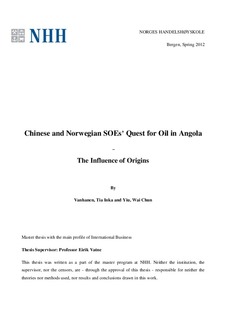| dc.description.abstract | The concept of Corporate Social Responsibility is currently being both researched extensively as well as receiving increasing attention in the global business environment. Due to the exceptional economic growth in China, Chinese businesses continue to expand their operations internationally to meet the domestic demand for various resources. Since their entry to the global business arena, Chinese practices have received varying levels of criticism and they have been accused of i.e. neo-colonialism on their operations in Africa.
The reasons for the differing perceptions on definitions of CSR are argued in this thesis to be a result of origins. National cultures arguably influence the business culture of enterprises, resulting in non-universal interpretations with respect to CSR policies and practices. The thesis addresses the differences in operations of two SOEs – Statoil & Sinopec – through analyses based on academic literature on CSR, stakeholders, different philosophical values of the case cultures, and a collection of secondary data.
The research results pointed out that the country of origin indeed plays a role in influencing organizational culture. Further observations also pointed out that the level of development in country of origin influences i.e. the extent to which companies engage in CSR activities. Statoil originating from a wealthy nation is setting high CSR standards to its operations, which can pose an operational challenge for other oil companies from less wealthy nations. Thus, China should further consider redefining its status on publishing information to increase its competitiveness in the global business arena, as their main issue appears to be non-disclosure of information expected by the West | no_NO |
